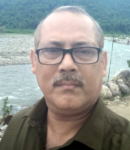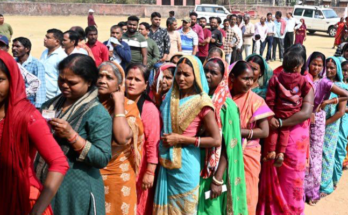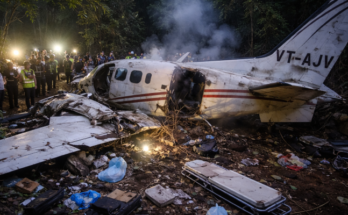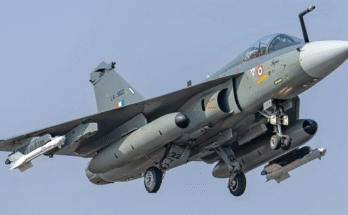 by Nava Thakuria
by Nava Thakuria
It was an annual event to commemorate the birth anniversary of Devarshi Narad, regarded as the world’s first journalist. A learned audience gathered at Sudarshanalaya in Guwahati on 1 June 2025, to listen to an insightful speech delivered by nationally acclaimed journalist and political commentator Harshvardhan Tripathi.
Addressing the Narad Jayanti function, organized by Vishwa Samvad Kendra Assam, Tripathi reflected on the values of Devarshi Narad, emphasizing that the celestial sage neither had a palatial bungalow nor practiced journalism under royal patronage, despite his access to all Gods and Goddesses. In contrast, he said, today’s media presents a disturbing picture—while some journalists chase government sponsorship, others pursue anti-national agendas.
Tripathi stressed that in the age of global information warfare, politicized narratives, and ideological polarization, Indian journalism must reconnect with its civilizational roots and rediscover its moral compass. He urged journalists to meet modern challenges with clarity, conviction, and courage.
Devarshi Narad, the Manasaputra of Lord Brahma, is revered in Hindu tradition as a divine messenger who communicated fearlessly across worlds—among Gods, demons, and humans. A devout follower of Lord Vishnu, Narad’s iconic chant ‘Narayan Narayan’ has resonated through Assamese literature since ancient times. Immortal and omnipresent, Narad is mentioned in the Ramayana, Mahabharata, and various Puranas, establishing him as an institution, not merely an individual.
Tripathi’s keynote address served not just as a tribute to Narad Muni but also as a critical reflection on the present condition of Indian media. He argued that today’s journalism has strayed from the principles of truth, courage, and dharma, falling instead into a colonial and leftist mindset.
He criticized sections of the media for avoiding core national issues like terrorism, national security, and cultural identity, choosing instead to distort or ignore them due to ideological biases. Citing the Pahalgam killings, where victims were targeted for their religion, Tripathi questioned why Indian media struggles to label such incidents as Islamic terrorism. “Why is it so difficult to call an act of Islamic terrorism by its name?” he asked, raising concerns over the media’s moral courage and honesty.
Tripathi also condemned the historic bias against indigenous defence technologies, which have now proven their worth on the battlefield. He pointed out that Indian systems, once mocked by biased commentators, have outperformed Pakistan’s imported American, Turkish, and Chinese weapons in the recent conflict and Operation Sindoor.
He expressed concern over journalists who support defeated political candidates and attempt to create unrest in society by projecting them as winners, calling such actions anarchic and dangerous.
Highlighting internal challenges, Tripathi blamed the so-called “equality politics” of the Left for fostering cultural alienation and social division. He urged media professionals to draw inspiration from Devarshi Narad’s ideals of fearless, impartial, and morally grounded communication.
He also criticized the current form of fact-checking, calling it a politicized tool of narrative control, far removed from genuine truth-seeking.
Tripathi concluded by reminding journalists that their personal conduct should reflect the values they preach—simplicity, integrity, and patriotism. “Media persons do not have more rights than the average Indian,” he asserted.
The event also witnessed the presentation of the Devarshi Narad Jayanti Award 2025 to prominent Assamese children’s writer and editor Shantanu Tamuli (original name: Pramod Tamuli). He was honored with an Assamese Cheleng Chadar, a citation, a memento, a cheque of Rs 50,000, and a collection of books. Tamuli expressed his gratitude to the organizers and the readers of his magazines Mouchak and Natun Aabiskar.
Three city-based journalists—Himanshu Pathak (Asomiya Khabar), Diganta Saharia (Prag News), and Khanin Deka (Niyomiya Barta)—were also felicitated with a Gamosa and a portrait of Bharat Mata.
The program began with the lighting of a ceremonial lamp in front of a figurine of Bharat Mata, followed by an invocation of the Narad Stotra performed by artiste Sharat Rag. The event was moderated by Naba Bujarbarua.
VSK Assam secretary Kishor Shivam welcomed the audience. Among the dignitaries present were VSK Assam president Gauranga Sharma, vice-president Guruprasad Medhi, RSS Asom Kshetra Prachar Pramukh Sunil Mahanty, Assam Publication Board secretary Pramod Kalita, and prominent personalities such as Diganta Biswa Sarma, Ramen Sarma, Jagadindra Raichoudhury, Rupam Barua, and others.




